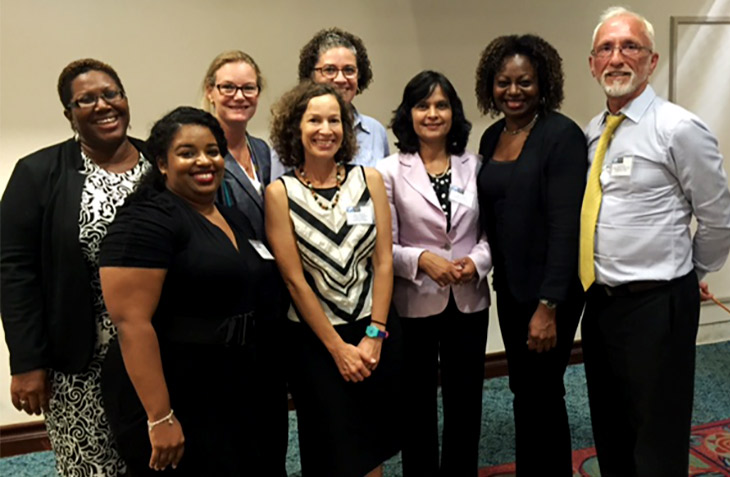The Health Policy Project ended in 2016. Work continued under Health Policy Plus (HP+) until 2022.
NEWS & VIEWS

USAID and Health Policy Project staff at the knowledge-sharing event. Photo by Health Policy Project.
September 3, 2015
BRIDGETOWN, Barbados—On September 2, 2015, the USAID- and PEPFAR-funded Health Policy Project (HPP) Caribbean Regional team convened a full-day end-of-project knowledge-sharing forum, “Stigma Reduction—Moving from Understanding to Outcomes” The forum provided an opportunity to discuss regional and national impact of the HPP and Pan Caribbean Partnership on HIV/AIDS (PANCAP)-implemented program to reduce stigma and discrimination against people living with HIV and key populations. The program improved regional coordination and communication about efforts to reduce HIV-related stigma and discrimination. It additionally expanded access to non-stigmatizing health services, in part through strengthening the capacity of people living with HIV and key to advocate for improved, respectful services.
Stakeholders in attendance included Ministry of Health representatives, donors, local key population and civil society leaders, activists, and researchers. In addition to discussions of lessons learned and the way forward in stigma prevention, the event also shared HPP/Caribbean Region’s successes. U.S. Embassy representatives highlighted the project’s accomplishments over the course of five years:
- 5 key tools developed and distributed
- 6 countries participating in the roll out of HPP’s Stigma Reduction Package in health facilities
- 20 regional nongovernmental organizations participating in elaboration of an Advocacy Agenda
- 32 civil society organizations involved in advocacy and networking capacity building
- 35 facilities established facility-level codes of conduct
- 140 key stakeholders and policymakers engaged in participatory data analysis of stigma surveys
- 143 people trained as trainer-facilitators in stigma reduction
- 1450 healthcare personnel and civil society representatives trained in stigma reduction
Keynote speaker John Boyce, Barbados Minister of Health, reiterated his country’s support for stigma-reduction programming, saying,
We are well aware that one cannot view HIV as someone else’s problem, the problem belongs to us. Therefore, stigma and discrimination against persons living with HIV and other vulnerable persons is unacceptable if we are to progress in our national response. Our goal as a government is to create a just society where all persons are fairly treated and have access to equal rights and opportunities.
HPP Project Director Suneeta Sharma offered closing remarks, saying, “HPP is working in more than 30 countries, and I can see the application of these tools, techniques, and packages across these contexts to improve the quality of services we can provide.”
Learn more about HPP’s work in the Caribbean Region here.
What's New
- Something to Build On: “Innovation Exchange” Celebrates the Health Policy Project’s Close and a New Beginning
- What Will it Take for Tanzania to Achieve ART Targets and Ensure Long-Term Sustainability of the HIV Response?
- Helping Kenya’s County Leaders Advocate for Increased Health Investments
- HPP Holds Working Meeting on Ensuring Responsible PEPFAR Transitions for Key Populations
- Health Policy Project Celebrates 2016 International Women's Day
- HPP Staff Participate in White House Conference on HIV Stigma Reduction

